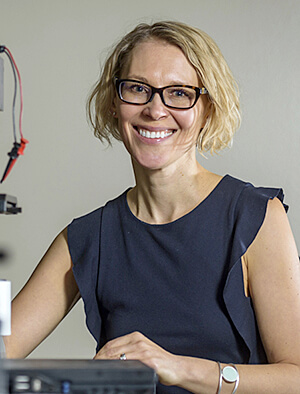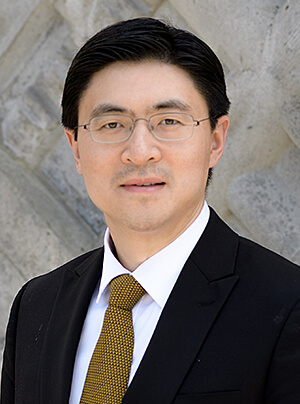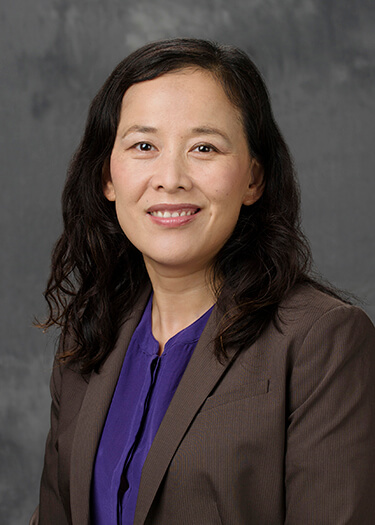December 9, 2020
Purdue’s innovative impact further enriched as 3 engineering professors chosen as National Academy of Inventors fellows
WEST LAFAYETTE, Ind. — Famous for both astronauts and quarterbacks, Purdue University is also known globally as a hotbed of innovation and invention.
Purdue is home to the largest university-affiliated business incubation park in the nation and also leads the nation as having the most technology transfers and business startups among universities without a medical school.
As further recognition of this leadership role, the National Academy of Inventors (NAI) has announced that three Purdue College of Engineering faculty members have been selected as fellows of this prestigious organization.
Purdue Engineering Dean Mung Chiang and professors Alexandra Boltasseva and Haiyan Wang were named to the list. Their selection, announced this week, brings the number of current Purdue faculty in NAI to 14 – with nine of those being current Purdue Engineering faculty.
The NAI Fellows Selection Committee designated 175 fellows for its 2020 class based on their highly prolific spirit of innovation in creating or facilitating outstanding inventions that have made a tangible impact on the quality of life, economic development and the welfare of society.
To date, NAI fellows hold more than 42,700 issued U.S. patents, which have created more than 13,000 licensed technologies and companies and created more than 36 million jobs. In addition, more than $2.2 trillion in revenue has been generated based on NAI fellow discoveries.
Election to NAI fellow is the highest professional distinction accorded solely to academic inventors. A Fellows Induction Ceremony is scheduled for June in Tampa, Fla.
 Alexandra Boltasseva
Alexandra Boltasseva
-
Alexandra Boltasseva, the Ron and Dotty Garvin Tonjes Professor of Electrical and Computer Engineering
Boltasseva holds 11 U.S. patents and one patent in Japan. Her contributions to the field of plasmonics are opening up new ways to focus and manipulate light at the nanometer scale. Her innovations have inspired low-power nanometer-scale optical and optoelectronic components such as tiny optical modulators and photodetectors, as well as nanoscale power-efficient light sources that have the potential to transform the fields of opto- and nanoelectronics, on-chip optical communication, and data recording storage and transmission.
Her work has received 22,249 citations (H-index of 69). She is the author of the most cited paper of Laser and Photonics Reviews journal (out of more than 600 papers) and the two most cited papers in the Optical Society of America’s Optical Materials Express (out of more than 2,000). In November 2020, she was named to the list of Highly Cited Researchers 2020 from the Web of Science Group. She has been featured as an invited speaker at 115 conferences, including five plenary and six keynote talks.
Boltasseva is an elected member of the Material Research Society Board of Directors and is leading the OSA’s journal Optical Materials Express as editor-in-chief. She previously served on the editorial boards of ACS Photonics, Scientific Reports (Nature Publishing Group), EDP (publisher of European Physics Journal and EPL), Advanced Electromagnetics, and the editorial advisory board of Advanced Optical Materials.
Among a select list of Boltasseva’s awards, she was a finalist for the Blavatnik National Award for Young Scientists in Physical Sciences and Engineering (2018), Materials Research Society Young Investigator Award (2013), IEEE Photonics Society Young Investigator Award (2013), and MIT Technology Review’s Global List of Innovators Under 35 (2011). She is a fellow of the Institute for Electrical and Electronics Engineers (IEEE - 2020), Optical Society of America (OSA - 2015) and International Society for Optical Engineers (SPIE - 2017).
 Mung Chiang
Mung Chiang
-
- Mung Chiang, the John A. Edwardson Dean of Engineering and Roscoe H. George Distinguished Professor of Electrical and Computer Engineering
Chiang is nearing the end of a yearlong public service with the United States Department of State as the science and technology advisor to the secretary of state. His research areas include optimization of communication networks; fog computing, edge networking and the Internet of Things; smart data pricing and network economics; and social learning networks and online social networks. He has 26,597 citations with an H-index of 77, and over 20 U.S. patents.
He is the founding CEO (2013) of DataMi, a startup that pioneered “open toll-free” solutions for mobile data operators in six continents. He is the co-founder of other startup companies and the OpenFog Consortium (2015), which in 2019 merged with Industrial Internet Consortium to form the world’s largest nonprofit in industrial IoT.
Previously the Arthur LeGrand Doty Professor of Electrical Engineering at Princeton University, Chiang is also the author of “Networked Life: 20 Questions and Answers,” and co-author of “Power of Networks.” He was the instructor of one of Princeton’s pilots in massive open online courses – “Networks: Friends, Money and Bytes,” which has reached more than 400,000 students since then.
Selected accolades include being named a Guggenheim Fellow (2014); NSF Alan T. Waterman Award (2013), the highest honor to one scientist in the U.S. under the age of 40 each year; and the Institute of Electrical and Electronics Engineers (IEEE) Kiyo Tomiyasu Technical Achievement Award (2012).
 Haiyan Wang
Haiyan Wang
- Haiyan Wang, the Basil S. Turner Professor of Engineering, Materials Engineering and the School of Electrical and Computer Engineering
Wang specializes in high-temperature superconductors, coated conductors, nanostructured functional ceramics for solid oxide fuel cells, plasmonics and photonics, ferroelectric and multiferroics, radiation tolerance materials and bulk structural metals and ceramics.
She pioneered the designs of vertically aligned nanocomposites in oxide-oxide, oxide metal, nitride metal and many other systems. She is a leader in the design and processing of ductile high-temperature ceramics via non-equilibrium processing techniques.
She holds 14 U.S. patents that have been licensed to three companies. In addition, she has published more than 550 journal articles (with 20,500 citations and an H-index of 68) and presented more than 300 invited and contributed talks at various international conferences.
She serves as an associate editor for the journals Science Advances and Vacuum, and is a section editor for BMC Materials and an MRS Bulletin volume organizer for 2020.
Wang is a fellow of Materials Research Society (MRS - 2019), American Physical Society (APS - 2017), American Association for the Advancement of Science (AAAS - 2016), American Ceramic Society (ACerS- 2015) and ASM International (2014). Select awards include TAMEST O’Donnell Award in Engineering (2015) and the ASM Silver Medal Award for Outstanding Mid-Career Materials Scientist (2011).
About Purdue University
Purdue University is a top public research institution developing practical solutions to today’s toughest challenges. Ranked the No. 5 Most Innovative University in the United States by U.S. News & World Report, Purdue delivers world-changing research and out-of-this-world discovery. Committed to hands-on and online, real-world learning, Purdue offers a transformative education to all. Committed to affordability and accessibility, Purdue has frozen tuition and most fees at 2012-13 levels, enabling more students than ever to graduate debt-free. See how Purdue never stops in the persistent pursuit of the next giant leap at https://purdue.edu/.
Media contact: Jim Bush, 765-336-1909, jsbush@purdue.edu
Sources: Mung Chiang, deanofengineering@purdue.edu
Alexandra Boltasseva, aeb@purdue.edu
Haiyan Wang, Hwang00@purdue.edu
Journalists visiting campus: Journalists should follow Protect Purdue protocols and the following guidelines:
- Campus is open, but the number of people in spaces may be limited. We will be as accommodating as possible, but you may be asked to step out or report from another location.
- To enable access, particularly to campus buildings, we recommend you contact the Purdue News Service media contact listed on the release to let them know the nature of the visit and where you will be visiting. A News Service representative can facilitate safe access and may escort you on campus.
- Correctly wear face masks inside any campus building, and correctly wear face masks outdoors when social distancing of at least six feet is not possible.
Note to journalists: Journalists visiting campus should follow visitor health guidelines.

